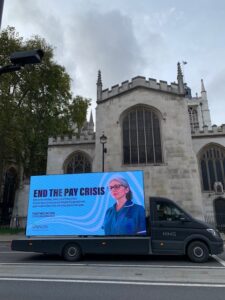Hundreds of trade union members from around the UK have descended on Westminster today, to put pressure on MPs to take drastic action to boost workers’ pay – the best possible solution to easing the cost of living crisis.
UNISON members were among those making their voices heard at the ‘We Demand Better’ lobby and rally, organised by the TUC.
A number of individuals set up meetings with their MPs, in order to share their stories, describe how the crisis is affecting the lives of ordinary workers, and impose on their elected representatives the need for better pay deals across the public sector.

The lobby meetings inside Parliament were taking place between 2-6pm this afternoon, to be immediately followed by a rally in the nearby Central Hall. UNISON Northern regional secretary Clare Williams will be among the speakers at the rally.
The UNISON members taking part were voicing the message of the union’s cost of living campaign, Together We Rise – that soaring prices don’t have to push people into poverty. It’s the government’s political choices that are doing that.
One group of healthcare workers from Southport and Ormskirk hospital (main picture) travelled down to London to lobby Damien Moore, MP for Southport, and Marie Rimmer, MP for St Helens South and Whiston.
Sue Barton, a clinical engagement manager, registered nurse and health and safety officer from Southport and Ormskirk Hospital
“I’m here to talk about the cost of living and our salaries and wages, really. We need a real pay increase in line with inflation, at the very least. People are really struggling, we’ve got band 5 nurses in our hospital going to food banks.
“You go to university, you learn a profession, you still have all of that to pay for, and now you can’t afford to live. You can’t afford to put food on the table. It’s simply not acceptable.”
Angela Wilson, a catering assistant and UNISON rep for Southport and Ormskirk
“What I see on a daily basis with some of my colleagues is wrong. It’s just awful, some of them can’t afford to make packed lunches for their children. It’s heat or eat – and people think that’s just a nice line that rhymes, but it’s a reality for so many families now.
“The people in the ivory towers across the road [Parliament] need to see what’s really going on in our country. They should come to the places we work day in, day out, and see what’s happening.
“I’ve seen my colleagues crying badly when their wage slip comes through, saying, ‘I can’t believe it, it’s not enough, I’ve got this bill to pay, that bill to pay, Christmas is coming up and I can’t afford to get the kids anything.’
“The job losses in the NHS are really bad because of the pressure staff are under. They can’t cope with the stress of the job. There’s a lady from our trust who recently got a job at Tesco. The job’s easier, there’s no stress, her money’s better than it was in the NHS. It’s ridiculous.
“I don’t know if they’re trying to outsource us, maybe this is part of the plan to sell us off by letting everyone leave, letting us be short-staffed. Soon we’ll have no NHS. It’s appalling.”
John Flannery, UNISON branch secretary for Southport and Ormskirk health branch
“We’ve had 12 years of austerity imposed by the government and NHS pay review body, which has seen a 20% real-terms cut in wages. This year, inflation is over 10% and we’re only being given a 4% rise. This has a significant impact on our members’ ability to just survive. The knock-on consequence has created staffing shortages where people don’t want to work for the NHS.”
Janet Harrison, learning and engagement facilitator, Southport and Ormskirk
“I want to ask my MP what the heck he thinks he’s playing at voting through measures that are going to destroy our NHS, crippling our public sector workers. People can’t afford to eat or heat their homes. We cannot take any more austerity. We need a pay rise in line with inflation, it’s disgusting that everything’s going up and we can’t get a decent pay rise, while millionaires are getting richer. The sooner we get rid of the Tories, the better.”
And from elsewhere in the union:

Julie Lawton, Staffordshire community health branch: welfare officer, workplace rep (above)
“I’ve not done anything like this before, I’m not particularly political, but as the branch welfare officer I can see people are really struggling. They need to be looked after and valued with better pay. Before, I was probably giving out around three food bank vouchers per month, now it’s three a day. Even the food banks are struggling, because people can’t afford to donate to them.
“I’m doing a welfare check for everyone who gets in touch with me now. I’m referring people to There For You, and there’s a lot of people saying, ‘I’ve got nothing, can you help me?’ I’m doing referrals to children’s charities, so parents can get nappies and kids’ beds and ‘keep warm’ bundles for the winter.
“We need pay in line with inflation. What can I tell people when they ask me what they can cut back on? They’re so upset and ashamed, they’re saying, ‘I’m working all the hours god sends and I still can’t pay my bills.
“Bills have gone up £400 a month on average, people can’t cope. What am I meant to say to them: Don’t watch TV? Don’t eat? Don’t shower? There’s nothing you can say to help people manage this. It needs to change from the top.”
Oliver Nicholls, UNISON member and healthcare support worker (above, with Julie).
Today was Oliver’s first time in London. He felt moved to speak out and lobby Jonathan Gullis, MP for Stoke-on-Trent North.
“The main thing I want to address is the cost of living crisis, specifically the energy crisis. This government seems to believe they can grow the economy, but how can people do that when people can’t even afford to spend the money they earn because they’re living day to day. There’s no logic to it whatsoever.
“I’ve never been to London before, never done anything like this before. It’s just one of those things, I’m a black and white thinker, if I see injustice I have to talk about it. I will speak up when things aren’t right.”
Juan Antonio Garcia, branch chair for UNISON Caerphilly local government branch (below)

“It’s a crime what’s going on. We’ve got workers not turning up for work because they can’t afford the petrol. We’ve all been through the pandemic, and where’s the thanks?
“Petrol is a big issue for our members, as is the cost of living in general. Food bills are going up. Heating’s going up and we’re being asked to work from home, so the heating costs are being passed to the workers with no extra home working allowances, no extra pay. People are broken, we’ve had enough.
“Let’s be honest: this isn’t something that’s just happened. Poverty is an ideology.”
Today’s event took place in the shadow of government threats of more public sector cuts, raising fears of a return to austerity.
Where relevant, UNISON’s members were also using the lobby as an opportunity to tell MPs about current pay disputes and ballots – in the NHS, higher education, the Environment Agency, the Food Standards Agency and the Care Quality Commission.
Interviews: Janey Starling
Portraits: Marcus Rose
The article Hundreds of workers lobby Parliament for better pay first appeared on the UNISON National site.


